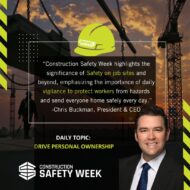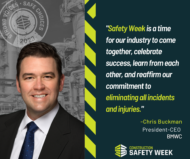Being safe means paying attention to both mind and body. It extends beyond wearing hardhats and safety glasses. It means recognizing how important mental health really is to everyone’s overall safety. From suicide to distractions that lead to devastating accidents, it is important that we all recognize the importance of total wellbeing. When workers are physically and mentally safe everyone wins. Below are some tips to help works be more mentally prepared by managing stress.
Tips to Help with Stress Relief from the National Alliance on Mental Illness:
- Accept your needs. Recognize what your triggers are. What situations make you feel physically and mentally agitated? Once you know this, you can avoid them when it’s reasonable to, and to cope when you can’t.
- Manage your time. Prioritizing your activities can help you use your time well. Making a day-to-day schedule helps ensure you don’t feel overwhelmed by everyday tasks and deadlines.
- Practice relaxation. Deep breathing, meditation and progressive muscle relaxation are good ways to calm yourself. Taking a break to refocus can have benefits beyond the immediate moment.
- Exercise daily. Schedule time to walk outside, bike or join a dance class. Whatever you do, make sure it’s fun. Daily exercise naturally produces stress-relieving hormones in your body and improves your overall physical health.
- Set aside time for yourself. Schedule something that makes you feel good. It might be reading a book, go to the movies, get a massage or take your dog for a walk.
- Eat well. Eating unprocessed foods, like whole grains, vegetables, and fresh fruit is the foundation for a healthy body and mind. Eating well can also help stabilize your mood.
- Get enough sleep. Symptoms of some mental health conditions, like mania in bipolar disorder, can be triggered by getting too little sleep.
- Avoid alcohol and drugs. They don’t actually reduce stress: in fact, they often worsen it. If you’re struggling with substance abuse, educate yourself and get help.
- Talk to someone. Whether to friends, family, a counselor or a support group, airing out and talking can help. Consider attending a NAMI Connection Recovery Support Group.
Below is a video from BMWC employees about today’s topic. Thank you to Gulf Coast HR Manager Nicole Bishop and Assistant EH&S Director Dave Cronk.




